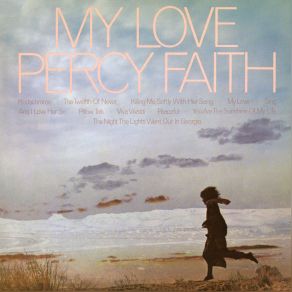My Love
Download links and information about My Love by Percy Faith. This album was released in 1973 and it belongs to Pop genres. It contains 11 tracks with total duration of 33:53 minutes.

|
|
|---|---|
| Artist: | Percy Faith |
| Release date: | 1973 |
| Genre: | Pop |
| Tracks: | 11 |
| Duration: | 33:53 |
| Buy it NOW at: | |
| Buy on iTunes $9.99 | |
Tracks
[Edit]| No. | Title | Length |
|---|---|---|
| 1. | My Love | 3:34 |
| 2. | You Are the Sunshine of My Life | 2:51 |
| 3. | Peaceful | 3:12 |
| 4. | Sing | 2:46 |
| 5. | The Twelfth of Never | 2:41 |
| 6. | Kodachrome | 2:57 |
| 7. | Pillow Talk | 3:57 |
| 8. | And I Love Her So | 3:37 |
| 9. | The Night the Lights Went Out In Georgia | 3:18 |
| 10. | Killing Me Softly With Her Song | 2:41 |
| 11. | Viva Vivaldi | 2:19 |
Details
[Edit]Percy Faith suffered two blows as a record seller in his career. First, his LPs stopped being big successes after the British Invasion of 1964, although they continued to do well enough to rank consistently among the Top 200 bestsellers for another nine years. But by the early '70s, a generation of soft rockers had emerged to steal the audience from easy listening veterans like him. Clair, his first album of 1973, only "bubbled under" the Billboard chart, his first newly recorded LP to miss the main chart since it was expanded to 200 titles in 1967. Then, inevitably, his next release, My Love, became his first to sell too poorly to rate any recognition at all. Looking at the selections, you can see why. Nine of the 11 tracks are Faith versions of pop hits from the first half of 1973. But when the likes of Paul McCartney and the Carpenters are already making lush, easy listening-style records like "My Love" and "Sing," who needs Percy Faith's versions? As usual, the conductor is at a loss when he tries for something up-tempo; his treatment of Paul Simon's "Kodachrome" is bizarre, and "The Night the Lights Went Out in Georgia" loses a lot without its whodunit lyrics. The two oldies among the selections are "The Twelfth of Never," Johnny Mathis' 1957 hit, which was arranged originally by Faith's Columbia Records colleague and competitor Ray Conniff, and one of Faith's classical borrowings, "Viva Vivaldi," a "switched on" treatment of the Spring movement of The Four Seasons. By 1973, albums like this had become inessential because the artists people like Faith watered down for their relaxed audiences had learned to do their own diluting.